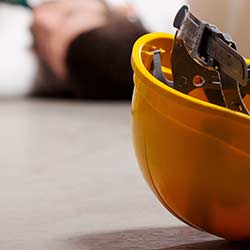
Construction Worker Deaths Continue
- October 25
- EVANS / DESHAZO / REILLEY
- Workplace Accidents
Construction in Texas is booming – so much so that some construction companies are turning down big contracts, because they don’t have the laborers needed for the job. One might assume that’s good news for construction workers, because it means there are plenty of job opportunities. But these jobs often pay very little, and workers have a high risk of workplace injuries and fatalities.
Texas leads the nation in construction workplace fatalities – a construction worker dies on the job every three days, and more than 70 Texas construction workers died at work during the first four months of 2017.
This deadly trend isn’t specific to Texas, however. An in-depth study found that in the south, construction workers are exposed to terrible risks and low wages, “that should not exist in the twenty-first century in the richest country in the world.”
The study, “Build a Better South,” was made possible by the Workers Defense Project, Partnership for Working Families, and Dr. Nik Theodore of the University of Illinois Chicago. Its findings revealed some disturbing trends in the construction industry.
Methodology and Findings
Build a Better South looked at working conditions for 1,435 construction workers in six southern cities, including Dallas and Houston. Researchers found:
- One in seven workers have suffered an on-the-job injury at some point; one in three had been injured in the previous 12 months.
- Employer-based medical insurance was available to only 43 percent of workers.
- Only 5 percent of workers injured in the previous 12 months had workers’ compensation benefits.
- Most workers do not have paid time off, so when they’re injured and can’t work, they lose income.
- 36 percent of workers had no access to drinking water on the jobsite, which employers are required to provide under federal law.
- Heat stress was common in the summer, and 16 percent of workers had to take time off work because the heat made them ill.
- Half of workers said they weren’t allowed rest breaks in the afternoon, when heat indexes are the highest.
The study included a tragic story about what can happen when workers are denied water and rest breaks in the summer heat. A Dallas construction worker had been working 14-hour days, with no rest or meal breaks. He complained to his supervisor that he felt ill and needed medical treatment, but his complaints were dismissed. He collapsed on the jobsite later in the day and died of multi-organ failure from severe heat stroke.
Vulnerable Populations
Of the 245,796 construction workers in Dallas, about half were born in Mexico. Foreign-born laborers, regardless of whether they are legally authorized to work in the United States, may be unaware of their rights under the law. Employers may deliberately misclassify those workers as “contractors” – meaning they’re not entitled to any benefits – instead of treating them as employees. And due to language barriers and fears of retaliation, foreign-born workers who are injured on the job may not know where to seek help or whether they should even report their injuries.
Laws Favor Businesses
Austin had made progress in improving working conditions for construction workers, by adopting recommendations from the Build a Better South study. But in July, Texas legislators were considering a bill that would nullify Austin’s local rules and forbid all cities and towns from enacting similar rules.

 Serving Clients Throughout Texas
Serving Clients Throughout Texas
 Chip Evans is a partner at Evans & Herlihy. Chip brings to the firm more than 20 years of experience as a trial lawyer representing Plaintiffs. It is the desire to help individuals, not corporations, that attracts Chip to this side of the docket. [
Chip Evans is a partner at Evans & Herlihy. Chip brings to the firm more than 20 years of experience as a trial lawyer representing Plaintiffs. It is the desire to help individuals, not corporations, that attracts Chip to this side of the docket. [